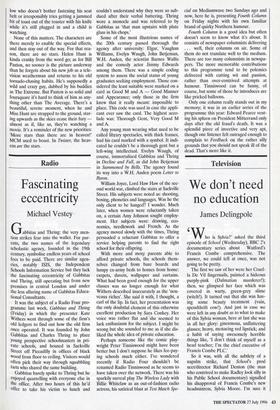Radio
Fascinating eccentricity
Michael Vestey
Gabbitas and Thring: the very men- tion strikes fear into the wallet. For par- ents, the two names of the legendary scholastic agency, founded in the 19th century, symbolise endless years of school fees to be paid. There are similar agen- cies, notably ISIS, the Independent Schools Information Service but they lack the fascinating eccentricity of Gabbitas and Thring, still operating but from new premises in central London and under the less alluring name of Gabbitas Educa- tional Consultants.
It was the subject of a Radio Four pro- gramme last week, Gabbitas and Thring (Friday) in which the presenter Kate Withers went through some of the firm's old ledgers to find out how the old firm once operated. It was founded by John Gabbitas and Charles Thring to place Young prospective schoolmasters in pri- vate schools, and housed in Sackville Street off Piccadilly in offices of black wood from floor to ceiling. Visitors would often pick their way through squabbling tarts who shared the same building.
Gabbitas barely spoke to Thring but he enjoyed quarrelling with everyone else in the office. After two hours of this he'd offer to take his victim to lunch and couldn't understand why they were so sub- dued after their verbal battering. Thring wore a monocle and was referred to by Gabbitas as 'that man upstairs with plate glass in his chops.'
Some of the most illustrious names of the 20th century passed thorough the agency after university: Elgar, Vaughan Williams, Evelyn Waugh, John Betjeman, W.H. Auden, the scientist Barnes Wallis and the comedy actor Jimmy Edwards among them. There was a simple coding system to assess the social status of young graduates seeking employment. Those con- sidered the least suitable were marked on a card as Good M and A — Good Manner and Appearance; only those in the firm knew that it really meant: impossible to place. This code was used in case the appli- cant ever saw the card. The highest acco- lade was: Thorough Gent, Very Good M and A.
Any young man wearing what used to be called library spectacles, with thick frames, had his card marked with a symbol. It indi- cated he couldn't be a thorough gent but a left-wing intellectual. Evelyn Waugh, of course, immortalised Gabbitas and Thring in Decline and Fall, as did John Betjeman in Summoned by Bells. The agency found its way into a W.H. Auden poem Letter to Byron.
William Joyce, Lord Haw Haw of the sec- ond world war, climbed the stairs at Sackville Street. His subjects were noted as: shooting, boxing, phonetics and languages. Was he the only client to be hanged? I wonder. Much later, when women were reluctantly taken on, a certain Amy Johnson sought employ- ment. Her subjects were: drawing, eco- nomics, needlework and French. As the agency moved slowly with the times, Thring persuaded a reluctant Gabbitas to offer a service helping parents to find the right school for their offspring.
With more and mot; parents able to afford private schools, the schools them- selves changed from bare boards and lumpy ex-army beds to homes from home: carpets, duvets, wallpaper and curtains. What had been good enough for the upper classes was no longer enough for what Withers described inaccurately as the 'nou- veaux riches'. She said it with, I thought, a curl of the lip. In fact, her presentation was the only doubtful element of this otherwise excellent production by Sara Conkey. Her voice was rather flat and 'she seemed to lack enthusiasm for the subject. I might be wrong but she sounded to me as if she dis- liked the whole idea of private education. Perhaps someone like the comic play- wright Peter Tinniswood might have been better but I don't suppose he likes fee-pay- ing schools much either. I've wondered recently if Radio Four shouldn't be renamed Radio Tinniswood as he seems to have taken over the network. There was his sparkily surreal play The Wireless Lady with Billie Whitelaw as an out-of-fashion radio actress, his satirical blast at Test Match Spe- cial on Mediumwave two Sundays ago and now, here he is, presenting Fourth Column on Friday nights with his own familiar brand of quirky Northern humour.
Fourth Column is a good idea but often doesn't seem to know what it's about. It consists of newspaper columnists delivering ... well, their columns on air. Some of them do not translate well to the medium. There are too many columnists in newspa- pers. The more memorable contributions to this programme tend to be polemics delivered with cutting wit and passion, rather than over-contrived attempts at humour. Tinniswood can be funny, of course, but some of those he introduces are like pricked balloons.
Only one column really stands out in my memory; it was in an earlier series of the programme this year: Edward Pearce vent- ing his spleen on President Mitterrand only days after the old fraud's death. It was a splendid piece of invective and very apt, though one listener felt outraged enough to complain to Feedback op the rather silly grounds that you should not speak ill of the dead. That's more like it.


























































 Previous page
Previous page